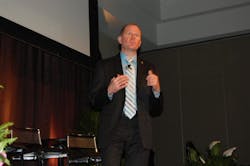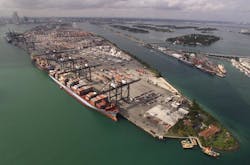Just figuring out what’s going on, however, is proving to be more of a challenge than usual, explained Larry Gross (at right), one of FTR’s senior consultants and resident rail freight expert, at a pre-meeting press briefing.
“The freight market is changing in very fundamental ways,” he said. “For example, I never expected in all my 30-plus years covering this market to watch fuel become a ‘non-issue’ in transportation, in terms of rising prices. That certainly changes the nature of things in freight and that’s but one example of the major change going on in this industry.”
Not all of those changes are positive, either, Gross noted, pointing in particular to: the growing trucking capacity shortage; more burdensome regulations; government dysfunction in Washington D.C.; and what he dubbed the “strange” economic behavior of late.
“There’s just an unusual level of uncertainty out there; there are too many unknowns,” Gross said. “The question is how those ingredients will come into play and affect other aspects of the market. For example, with the equipment [truck, trailer, and railcar] markets peaking, with they go on to plateau or follow a downward slope?”Yet Eric Starks (at left), FTR’s president, noted something else that’s he gleaned from discussions with motor carriers over the last month and a half ahead of his firm’s annual gathering: that most are relatively optimistic about the state of the freight world.
They also told him that they don’t see the U.S. economy going “into the tank” but rather believe it will experience some “hiccups” before continuing to move forward.
Based on the broader economic data FTR analyzes, Starks agrees with that assessment by and large.
“Take all the recent volatility in the equity markets we’ve seen due to China,” he said. “If you looked at the transportation industry specifically, they’d already experienced a falloff in activity from China; they’d already digested and adjusted to that. The equity markets are really just catching up to where transportation is.”
Both Starks and Gross feel that there are no “internal imbalances” within the U.S. economy at this point that could trigger a recession. Rather, the economic “daggers” exist outside of the U.S. in the struggling economies in Asia, Latin America and Russia.
“There are a lot of economic issues globally, but when you look at North America, internally, here are no imbalances,” Starks said. “However, in terms of upside potential, that’s become more constrained.”
Gross likened the current state of the U.S. economy as to that of a giant weighted down with chains and pulling the rest of the world’s economies with it. “So far the giant is slowing but not stopping,” he said.Part of that confidence comes from strong “underlying” data, Starks noted, such as the current increase in new home construction, business investment, and record automotive sales.
“Sometimes there is a disconnect; many say we should feel more pessimistic but that data is not showing that,” he explained. “Our challenge is to filter out the noise.”
When it comes to freight transportation specifically, though, many risks do remain.
“There is a lot of risk near-term around the economy,” Starks said. “For example, inventory levels are up, largely as a result of the bad weather in the first quarter of this year and the West Coast port disruptions. That has to be worked down so that may affect freight demand near term.”
Longer term, though, regulations pose the greatest threat, made doubly so because Congress will be required to act in some cases to head off trouble – and quick action is something Gross said Congress seems unable to do of late.
“We’ll get into that more over the next few days during the conference,” he noted.






